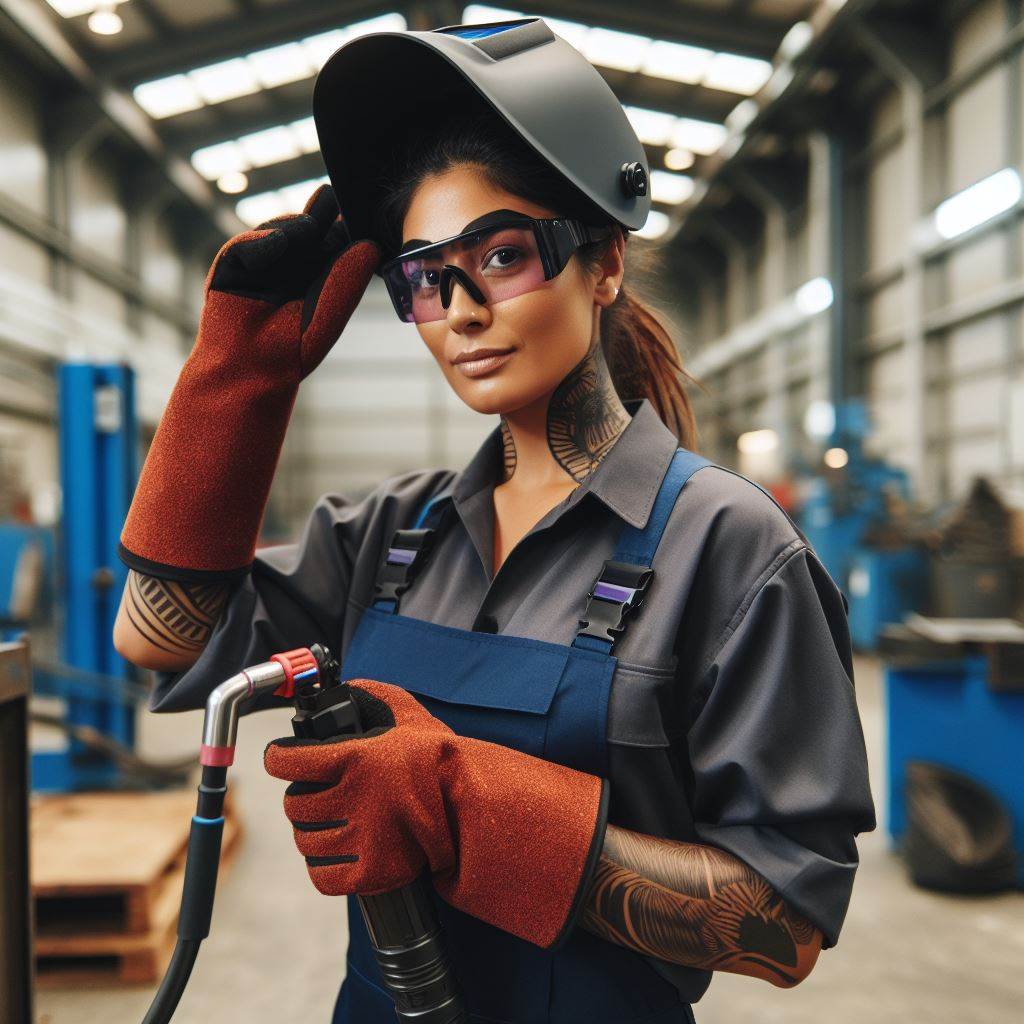Introduction
Underwater welding in New Zealand is a captivating and distinctive field, offering unique aspects that set it apart.
Descending into the depths, these skilled welders fuse metal beneath the ocean’s surface, creating a niche that few can master. Get ready to dive into the fascinating world of underwater welding!
This demanding and specialized profession requires exceptional skills both as a welder and a diver.
With each dive, these brave individuals face unpredictable currents, extreme pressures, and limited visibility, making underwater welding an extraordinary and high-risk occupation.
The beauty of underwater welding lies in the fact that it combines two vastly different worlds – the world of welding and the world of diving.
Welders must adapt their techniques to the challenging underwater environment, where even the smallest mistake can have catastrophic consequences.
New Zealand, with its stunning coastline and abundant marine life, offers a breathtaking backdrop for underwater welding projects.
From repairing structures damaged by the relentless force of the ocean to constructing underwater pipelines, this niche field plays a crucial role in maintaining and expanding the country’s infrastructure.
In this section, we will explore the intriguing techniques, equipment, and safety measures employed by underwater welders in New Zealand.
We will unravel the secrets of their training, the unique challenges they face, and the rewards that come with mastering this rare and specialized craft.
So, fasten your diving gear and prepare to descend into the depths of underwater welding in New Zealand – an endeavor that requires a unique blend of skill, bravery, and a passion for the unknown.
Overview of Underwater Welding
Underwater welding is a specialized technique used to join metals underwater, primarily for repair and maintenance work.
The key challenges and risks involved in underwater welding
The key challenge in underwater welding is the presence of water, which can cause numerous risks to the process.
These risks include increased electrical resistance, visibility issues due to poor water clarity, and the potential for weld contamination.
The demand for underwater welders globally and in New Zealand
There is a global demand for underwater welders, especially in industries such as offshore oil and gas, marine construction, and underwater infrastructure maintenance.
New Zealand, with its extensive coastline and marine resources, also requires skilled underwater welders to fulfill various projects and contracts.
Underwater welding is a unique skill that requires specific training and certification.
It is a combination of diving expertise and welding proficiency, making it a niche field with a limited number of qualified professionals.
Training Path to Underwater Welding Expertise
To become an underwater welder, individuals must first obtain a commercial diving certification. This involves extensive training in diving techniques, safety protocols, and underwater communication.
Once the diving certification is obtained, individuals can then undergo specialized training in welding techniques and equipment specific to underwater conditions.
This training includes knowledge of different welding methods, such as dry chamber welding, saturation diving, and hyperbaric welding.
Underwater welding poses significant risks, including the potential for electric shock due to the water’s conductivity.
To mitigate this risk, specialized welding equipment and techniques are used, such as welding isolation and monitoring systems.
Underwater Welding: Risks, Demand, and Opportunities in New Zealand
In addition to the hazards of electric shock, divers also face the risk of decompression sickness, commonly known as the bends.
This occurs when divers ascend too quickly from significant depths, causing nitrogen bubbles to form in their bloodstream.
Proper dive planning and adherence to decompression protocols are crucial in preventing this condition.
Despite the challenges and risks, the demand for underwater welders remains high globally, driven by the need for infrastructure maintenance and repair in offshore and underwater environments.
New Zealand, with its vast coastal areas and strong marine industry, offers ample opportunities for skilled underwater welders.
Personalized Career Consulting
Unlock your potential with expert career advice tailored to your goals. Get personalized guidance and actionable steps toward your dream career in New Zealand.
Get StartedIn New Zealand, underwater welders are regularly employed in various sectors, including aquaculture, port and harbor construction, and marine salvage operations.
The country’s underwater welding market is steadily growing, leading to a positive job outlook for qualified professionals.
Emerging Opportunities in Underwater Welding
The demand for underwater welders is expected to rise further as offshore renewable energy projects, such as underwater wind farms, become more prevalent.
These projects require constant maintenance and repair, presenting lucrative opportunities for skilled underwater welders.
In essence, underwater welding is a niche field that requires specialized training and certification.
While it poses numerous risks and challenges, the demand for underwater welders is high globally and in New Zealand.
As the marine industry continues to expand, the need for skilled professionals in underwater welding will only increase.
Read: NZ Carpentry: Skills and Tools Needed
Requirements for Underwater Welders
Qualifications and certifications
- To become an underwater welder in New Zealand, individuals need to possess certain qualifications and certifications.
- A valid commercial diving certificate is essential, such as the Diver’s Certification Board of New Zealand (DCBNZ).
- Completion of specialized welding courses is also necessary to gain the required skills and knowledge.
- Welders must be certified in accordance with the American Welding Society (AWS) standards.
- Specific certifications such as ISO 9606-1 or AWS D3.6 would further enhance an underwater welder’s credentials.
- Proof of physical fitness and good health is crucial, including passing a thorough medical examination.
Necessary skills and experience
- Underwater welding demands a unique set of skills and experience due to its challenging nature.
- Proficiency in welding techniques such as shielded metal arc welding (SMAW) and flux-cored arc welding (FCAW) is necessary.
- Strong mechanical aptitude and understanding of welding principles are essential for successful underwater welders.
- Excellent hand-eye coordination, as well as the ability to work in tight and confined spaces, is vital.
- Experience in commercial diving and knowledge of diving procedures are advantageous.
- Underwater welders should possess problem-solving skills to address unforeseen challenges that may arise during operations.
Specialized training programs
- New Zealand offers various specialized training programs to further enhance an underwater welder’s expertise.
- The New Zealand Underwater Welding Institute (NZUWI) provides comprehensive courses in underwater welding.
- These programs offer hands-on training in a controlled underwater environment to simulate real-world scenarios.
- Students receive instruction on welding techniques, safety procedures, and equipment maintenance.
- The NZUWI’s training programs take into account international standards and certifications for underwater welding.
- Graduates from these programs gain a competitive edge and increase their employability in the field.
In general, becoming an underwater welder in New Zealand requires specific qualifications, certifications, skills, and experience.
A valid commercial diving certificate, specialized welding courses, and certifications following international standards are essential.
Proficiency in welding techniques, mechanical aptitude, and problem-solving skills are crucial for success in this field.
Furthermore, several specialized training programs provided by institutions like the NZUWI exist to further develop underwater welding skills and knowledge.
By meeting these requirements and undergoing specialized training, individuals can pursue a rewarding career as an underwater welder in New Zealand.
Read: Top Carpentry Courses in New Zealand
Underwater Welding in New Zealand
Underwater welding is an essential field in New Zealand, with specific applications and industries that rely on skilled professionals in this niche area.
The country’s economy greatly benefits from the contributions of underwater welders. Let’s explore the specific applications and industries that employ underwater welders in NZ.
One of the key industries that extensively utilizes underwater welding is offshore oil and gas.
With its vast coastline, New Zealand has several offshore oil and gas platforms that require regular maintenance and repair work.
Underwater welders play a crucial role in ensuring the structural integrity of these platforms, as they are responsible for welding various components and pipelines underwater.
The underwater welding projects recently completed or ongoing in New Zealand
Another industry that heavily relies on underwater welding in New Zealand is shipbuilding and repair.
The country’s maritime sector is significant and includes commercial vessels, naval ships, and fishing boats.
When these vessels require maintenance or repair, underwater welders are called upon to carry out specialized welding operations, such as hull repairs or attaching new components.
Underwater construction projects also require the expertise of underwater welders in New Zealand.
These projects may involve the installation or repair of underwater pipelines, bridges, or even the construction of offshore wind farms.
Underwater welders collaborate with engineers and construction teams to ensure the successful completion of these projects, often working in challenging underwater conditions.
Recently, there have been several notable underwater welding projects completed or ongoing in New Zealand.
One such project was the repair and reinforcement of a damaged underwater pipeline in a remote coastal region.
Underwater welders were able to perform precision welding to restore the pipeline’s integrity and prevent any further damage.
In another project, underwater welders were involved in the construction of an offshore wind farm.
They were responsible for welding the turbine foundations and securing them to the seabed, ensuring the stability and functionality of the wind farm.
The importance of underwater welding for the country’s economy
The importance of underwater welding for New Zealand’s economy cannot be overstated.
The country’s coastal industries, such as fishing and tourism, heavily rely on the proper functioning of maritime vessels and structures.
Without the expertise of underwater welders, these industries would suffer from costly downtime and potential safety risks.
Moreover, New Zealand’s offshore oil and gas sector contributes significantly to the country’s economy.
Underwater welders play a pivotal role in ensuring the continuous operation of offshore platforms, maintaining a stable energy supply and supporting the nation’s energy sector.
Transform Your Career with a Professional CV and Cover Letter
Stand out to employers with an ATS-optimized resume and tailored cover letter designed to match your dream role. Let us craft your job application materials for success!
Get StartedIn fact, underwater welding is a niche field that has specific applications and industries in New Zealand.
The country’s economy greatly benefits from the contributions of underwater welders in offshore oil and gas, shipbuilding and repair, and underwater construction projects.
The recent projects completed or ongoing in New Zealand showcase the importance of underwater welding for maintaining the integrity and functionality of crucial maritime structures.
Read: Kiwi Carpenter Salary Insights 2024
Opportunities and Advancements in Underwater Welding
Underwater welding is a highly specialized field that requires skilled professionals who can work in challenging environments.
With emerging technologies and techniques, this niche field offers exciting opportunities for growth and advancement in New Zealand.
Let’s explore some of these opportunities and advancements, as well as the support organizations available for professionals in this field.
Emerging Technologies and Techniques
- Diverless welding systems are gaining popularity, allowing for remote operations and increased efficiency.
- Rising demand for underwater repairs and maintenance creates a need for advanced welding techniques.
- Emerging robotics technology is revolutionizing the way underwater welding is performed, enhancing safety and precision.
- Laser welding, with its faster and cleaner process, is becoming an increasingly important technique in underwater welding.
- Improvements in underwater welding equipment and protective gear are making the job safer and more efficient.
These emerging technologies and techniques present exciting prospects for underwater welders in New Zealand.
With new skills and knowledge, professionals in this field can stay ahead of the curve and secure high-paying opportunities.
Growth Opportunities in New Zealand
- New Zealand’s extensive coastline and maritime industry provide a fertile ground for underwater welding projects.
- Renewable energy initiatives, such as offshore wind farms, offer significant growth opportunities for underwater welders.
- The expansion of underwater infrastructure, including pipelines and underwater structures, creates a demand for skilled professionals.
- The marine oil and gas industry in New Zealand requires underwater welders for maintenance and repairs.
- Underwater welding skills can also be applied to underwater salvage operations and marine archaeology projects.
By tapping into these growth opportunities, underwater welders in New Zealand can build successful careers and contribute to the development of vital underwater projects.
Support Organizations for Professionals
- The New Zealand Underwater Welding Association (NZUWA) promotes the interests and welfare of underwater welders.
- NZUWA provides networking opportunities, training resources, and industry updates to its members.
- The Professional Divers Association of New Zealand (PDANZ) offers support and advocacy for professional divers, including underwater welders.
- PDANZ organizes events, seminars, and workshops to enhance the skills and knowledge of its members.
- Trade organizations, such as the New Zealand Marine Industry Association, also provide valuable support and resources for underwater welders.
These support organizations play a crucial role in connecting professionals, providing ongoing education, and promoting the welfare of underwater welders in New Zealand.
Therefore, the field of underwater welding in New Zealand is brimming with opportunities and advancements.
By embracing emerging technologies and techniques, underwater welders can stay at the forefront of their profession.
With a growing demand for skilled professionals in various industries, there is immense potential for career growth.
Additionally, support organizations like NZUWA and PDANZ offer valuable resources and networking opportunities, ensuring the success and well-being of underwater welders in New Zealand.
Read: Carpenter Apprenticeships in NZ Explained

Challenges and Rewards
Addressing the Physical and Mental Challenges
- Underwater welders face extreme pressure due to the depth and isolation of their work environment.
- The physical demands of welding underwater include working in confined spaces and handling heavy equipment.
- Mental challenges arise from the need for constant focus, problem-solving, and dealing with unpredictable situations.
- Adaptation to reduced visibility underwater requires exceptional spatial awareness and hand-eye coordination.
- Working for prolonged periods in cold temperatures can take a toll on both physical and mental well-being.
- Underwater welders often experience fatigue, muscle strains, and joint pain due to the physically demanding nature of their job.
Potential Risks and Safety Precautions
- Underwater welding involves potential electric shock hazards, which can be fatal if safety precautions are not followed.
- Divers may encounter marine life, hazardous materials, and unstable structures, posing additional risks.
- Exposure to welding fumes and noise levels underwater can lead to respiratory and hearing problems.
- Proper training in safety protocols, equipment usage, and emergency procedures is crucial for underwater welders.
- Regular equipment maintenance and strict adherence to industry guidelines are essential to minimize risks.
- Monitoring gas supply, oxygen levels, and dive time ensures the safety and well-being of underwater welders.
Rewarding Aspects of a Career in Underwater Welding in New Zealand
- A career in underwater welding offers unique opportunities to work in challenging and diverse environments.
- Underwater welders play a vital role in constructing and maintaining marine infrastructure, such as oil rigs and bridges.
- The demand for skilled underwater welders provides a stable job market and potential for career growth.
- Working in a close-knit team fosters strong professional relationships and a sense of camaraderie.
- Underwater welders have the chance to travel to different locations and explore the stunning underwater world.
- The financial rewards can be significant, with underwater welders often earning higher salaries compared to their onshore counterparts.
- Successful underwater welders gain a sense of accomplishment from overcoming challenges and completing complex projects.
- The ever-evolving nature of underwater welding ensures continuous learning and development of new skills.
- Contributing to vital infrastructural projects gives underwater welders a sense of pride and purpose in their work.
Underwater welding in New Zealand presents both challenges and rewards. The physically and mentally demanding nature of the job requires exceptional skills, training, and adherence to safety precautions.
However, the rewarding aspects of this niche field, such as high earning potential, job stability, and the opportunity to make a tangible impact on marine infrastructure, make it an enticing career choice for those seeking adventure and personal growth.
Conclusion
In closing, underwater welding is a niche field that plays a significant role in New Zealand’s economy and infrastructure development.
Through this blog post, we have explored the unique challenges and opportunities that underwater welders face.
Underwater welding offers a range of benefits, including the ability to repair and maintain underwater structures, such as offshore rigs and pipelines, without the need for costly and time-consuming dry-docking.
It also contributes to job creation and economic growth within the country.
Moreover, the demand for skilled underwater welders is on the rise, creating excellent career prospects for those interested in this field.
The specialized training and certifications required to become an underwater welder make it a valuable and sought-after profession.
If you are considering a career in underwater welding, New Zealand offers a conducive environment with its extensive coastline and diverse marine infrastructure projects.
Exploring opportunities in this niche field can lead to exciting and fulfilling career prospects.
Lastly, underwater welding is not only a fascinating field but also an essential one for New Zealand’s maritime industry.
The importance of underwater welders in maintaining and repairing critical underwater structures cannot be overstated.
Boost Your Career with a Standout LinkedIn Profile
Attract recruiters and expand your network with a fully optimized LinkedIn profile tailored to highlight your strengths and professional goals. Let your profile open doors to new opportunities!
Get OptimizedSo, if you have an interest in welding and a sense of adventure, consider a career in underwater welding and contribute to the growth and development of New Zealand’s niche field.




